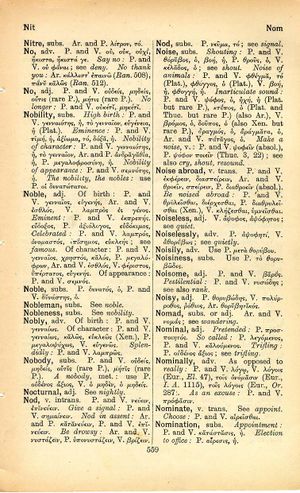no: Difference between revisions
Φίλους ἔχων νόμιζε θησαυροὺς ἔχειν → Tibi si est amicus, esse thesaurum puta → Mit Freunden, glaub es nur, besitzt du einen Schatz
m (Text replacement - "<b class="b2">Ran.</b>" to "''Ran.''") |
(6_11) |
||
| Line 7: | Line 7: | ||
P. and V. [[οὐδείς]], [[μηδείς]], [[οὔτις]] (rare P.), [[μήτις]] (rare P.). | P. and V. [[οὐδείς]], [[μηδείς]], [[οὔτις]] (rare P.), [[μήτις]] (rare P.). | ||
<b class="b2">No longer</b>: P. and V. [[οὐκέτι]], [[μηκέτι]]. | <b class="b2">No longer</b>: P. and V. [[οὐκέτι]], [[μηκέτι]]. | ||
}} | |||
{{Lewis | |||
|lshtext=<b>no</b>: nāvi, 1, v. n. νέω,<br /><b>I</b> to [[swim]], [[float]].<br /><b>I</b> Lit.: [[alter]] nare cupit: [[alter]] pugnare paratu'st, Enn. ap. Paul. ex Fest. p. 166 Müll. (Ann. v. 258 Vahl.): pueris, qui nare discunt, scirpea induitur [[ratis]], Plaut. Aul. 4, 1, 9; cf. [[below]], Hor. S. 1, 4, 120: [[pinus]] Dicuntur liquidas Neptuni nāsse per undas, Cat. 64, 1: nat [[lupus]], Ov. M. 1, 304: nantem delphina per undas, id. H. 19, 199: [[piger]] ad nandum, id. ib. 18, 210: ars nandi, id. Tr. 2, 486: nat [[tibi]] [[linter]], Tib. 1, 5, 76; Luc. 8, 374.—Prov.: nare [[sine]] cortice, to [[swim]] [[without]] corks, i. e. to be [[able]] to do [[without]] a [[guardian]] (cf. [[above]] the [[passage]] in Plaut. Aul. 4, 1, 9), Hor. S. 1, 4, 120.—<br /><b>II</b> Poet., transf., to [[sail]], [[flow]], [[fly]], etc.: cum juventus Per [[medium]] classi [[barbara]] navit Athon, Cat. 66, 45: (undae) nantes [[refulgent]], id. 64, 274: nare per aestatem liquidam suspexeris [[agmen]] ([[apium]]), Verg. G. 4, 59.—Of the eyes of [[drunken]] persons, to [[swim]]: nant oculi, Lucr. 3, 480; v. [[nato]].— Hence, [[nans]], antis, P. a., [[swimming]], floating: nantes scaphae, Gell. 10, 26, 10; as subst., a swimmer; [[hence]], nantes, ĭum, f., [[swimming]] fowls, i. e. geese, ducks, etc.: greges nantium, Col. 8, 14, 1. | |||
}} | }} | ||
Revision as of 08:39, 13 August 2017
English > Greek (Woodhouse)
adv.
P. and V. οὐ, οὐκ, οὐχί, ἥκιστα, ἥκιστά γε. Say no: P. and V. οὐ φάναι; see deny. No thank you: Ar. κάλλιστʼ ἐπαινῶ (Ran. 508) , πάνυ καλῶς (Ran. 512). adj. P. and V. οὐδείς, μηδείς, οὔτις (rare P.), μήτις (rare P.). No longer: P. and V. οὐκέτι, μηκέτι.
Latin > English (Lewis & Short)
no: nāvi, 1, v. n. νέω,
I to swim, float.
I Lit.: alter nare cupit: alter pugnare paratu'st, Enn. ap. Paul. ex Fest. p. 166 Müll. (Ann. v. 258 Vahl.): pueris, qui nare discunt, scirpea induitur ratis, Plaut. Aul. 4, 1, 9; cf. below, Hor. S. 1, 4, 120: pinus Dicuntur liquidas Neptuni nāsse per undas, Cat. 64, 1: nat lupus, Ov. M. 1, 304: nantem delphina per undas, id. H. 19, 199: piger ad nandum, id. ib. 18, 210: ars nandi, id. Tr. 2, 486: nat tibi linter, Tib. 1, 5, 76; Luc. 8, 374.—Prov.: nare sine cortice, to swim without corks, i. e. to be able to do without a guardian (cf. above the passage in Plaut. Aul. 4, 1, 9), Hor. S. 1, 4, 120.—
II Poet., transf., to sail, flow, fly, etc.: cum juventus Per medium classi barbara navit Athon, Cat. 66, 45: (undae) nantes refulgent, id. 64, 274: nare per aestatem liquidam suspexeris agmen (apium), Verg. G. 4, 59.—Of the eyes of drunken persons, to swim: nant oculi, Lucr. 3, 480; v. nato.— Hence, nans, antis, P. a., swimming, floating: nantes scaphae, Gell. 10, 26, 10; as subst., a swimmer; hence, nantes, ĭum, f., swimming fowls, i. e. geese, ducks, etc.: greges nantium, Col. 8, 14, 1.

